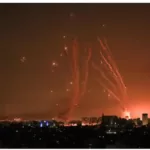In a dramatic escalation of the Israel-Hamas conflict, Israel has officially declared a “complete siege” on Gaza while launching a barrage of airstrikes on the Palestinian enclave. Simultaneously, Hamas claims that Israeli bombings have resulted in the deaths of Israeli hostages held within Gaza.
The situation unfolded after Palestinian militants conducted a shocking, multi-front assault, resulting in over 700 casualties in Israel, making Saturday the deadliest day in the nation’s history. Responding decisively, Israel initiated hundreds of airstrikes from both air and sea, leading to over 500 Palestinian casualties in Gaza, a densely populated area housing 2.3 million residents who have limited avenues of escape.
On Sunday, Israeli Prime Minister Benjamin Netanyahu formally declared war and summoned 300,000 reservists for potential ground operations in Gaza. This historical decision, however, poses unique challenges as Israeli forces must navigate an urban warfare scenario while attempting to rescue dozens of hostages likely concealed within tunnels and basements across the Gaza Strip.
On Monday, Abu Ubaida, spokesperson for Hamas’s armed wing, confirmed grim news for the Israeli public, alleging that Israeli bombardments had resulted in the deaths of “four of the enemy’s captives and their captors.”
Qatar, known for its past mediation efforts between Hamas and Israel, has initiated urgent negotiations to secure the release of Israeli women and children in exchange for 36 Palestinian women and children held in Israeli prisons. These negotiations, conducted in coordination with the United States, are reportedly progressing positively, albeit without a finalized agreement on logistics or release mechanisms.
The captives consist of civilians, including women, children, older adults, and soldiers, hailing mostly from Israel but also including individuals of various nationalities. Israel’s Ambassador to the United Nations, Gilad Erdan, has confirmed that dozens of American citizens, primarily dual nationals, are among the hostages.
Hamas’s audacious attack, involving militants breaching heavily fortified barriers and targeting unarmed civilians, has pushed the Israeli military into an unprecedented struggle to regain control of its territory. Palestinian militants persistently launch rockets deep into Israeli territory, exacerbating the security crisis.
Israel’s assertion of control over towns and villages in its southern territory was only declared on Monday, more than two days after the initial assault. However, acknowledging the likelihood of militants hiding within Israel, the chief military spokesperson, Rear Admiral Daniel Hagari, noted that there may still be “terrorists” in the area.
In an extraordinary move, Israeli Defense Minister Yoav Gallant declared a complete siege on the Gaza Strip, a term seldom publicly uttered by Israeli officials. Gallant outlined the stark consequences of this action, emphasizing that there will be no access to electricity, food, or fuel, as all entry points will be closed. The response, he stated, is driven by the nature of the conflict, characterizing those on the opposing side as “human animals.”
The status of the land crossing between Gaza and Egypt, situated to the south, remains uncertain. Residents of Gaza require permission to enter Egypt, a process that can often span days or even weeks before approval is granted.
Saturday’s audacious attack by Hamas took Israel’s renowned military and intelligence apparatus by surprise, plunging the nation into chaos as gun battles erupted on its streets for the first time in decades. Militants breached the fortified border, advanced several miles into Israel, and indiscriminately targeted civilians.
Israeli rescue service Zaka reported the recovery of over 260 bodies from the site of the Supernova music festival near the Re’im kibbutz, close to the Israel-Gaza border. Images and videos from the scene depict festivalgoers fleeing in desperation as they faced aggression from Hamas gunmen.
Early on Monday, Lieutenant Colonel Jonathan Conricus, spokesperson for the Israel Defense Forces (IDF), conveyed the dire situation within Israel. He described it as the “worst day in Israeli history,” as the death toll reached unprecedented levels. Conricus alluded to the significant number of Israeli civilians and military personnel forcibly moved into Gaza without specifying precise figures.
Gaza has been under a 16-year Israeli blockade since Hamas’s electoral victory in 2006, coupled with regular closures at the southern border with Egypt.
Conricus emphasized that the IDF’s response aims to ensure that, at the end of the conflict, “Hamas will not be able to govern the Gaza Strip.”







